- Home
- Gregory Maguire
Egg & Spoon Page 10
Egg & Spoon Read online
Page 10
It must be said that her plan was vague. She intended to improvise her way from the train once it arrived at Saint Petersburg. She’d find the Tsar somewhere. She’d ask him to release Luka from military service. And, while she was at it, why not release all the other men of Miersk? That couldn’t be too complicated.
Elena discovered a drawer with a set of loose shifts in warm girlish colors. She guessed that they were sleeping gowns. Carefully she undressed and hung up the clothes she had been wearing, then washed her hands and her face and brushed her hair. It was starting to like being brushed, she thought. Then she climbed under the quilts and blankets and extinguished the lamp. She could hear Miss Bristol snoring softly in her room along the passage. As Elena drifted off to sleep, she wondered how long she could maintain this charade, how close to Saint Petersburg they were at this point.
Her father, pointing: Go home. Where could he be, that he still came to her in her dreams?
In that certain black-and-grey half hour, before dawn starts to lend pinkness to the world, she woke up. Why? Something had changed. Oh: the train was standing still. She peered out the window and saw nothing but an airy leafless birch woods stretching as far as definition held.
She couldn’t hear the tympani of Miss Bristol’s aggravated sinuses. Everyone was asleep so deeply that it felt as if they were gone.
Perhaps that dream had made her silly, but the longer she lay in bed, listening for some sound or another, the more she felt that something had happened to the entire train. A spell of some sort had fallen upon it. Everyone else was dead, or spirited away, or sleeping a hundred years. She alone was left to perform the task that must be undertaken to break the enchantment.
She pushed the covers back and tiptoed to the door. She turned the key slowly so as not to allow for a single creak, and then she opened the door about four inches to begin to peer out.
A foot slammed into the doorway, and an elbow. “Open up.”
She threw herself against the door. To no avail.
“Open, I say, or I’ll scream Monsieur d’Amboise out of his dormez-vous. Miss Ekaterina, open.”
Miss Bristol hurled herself against the door from the outside. She was bigger and stronger than Elena. She gained enough space to wiggle her shoulder and then her hip into the breach. When Miss Bristol’s knee began to show, Elena gave up and retreated to the bed and pulled the covers over her head.
It was a feeble gambit. It didn’t stop the governess for a moment. She lunged onto the bed, sat on Elena’s legs, and yanked at the covers. “You’ve taken a scissors to your beautiful hair to escape being forced to the Tsar’s ball, is that it? You’re ashamed of yourself, as you ought to be — let me see you, you ungrateful child —”
What she saw startled her into speechlessness. Her mouth just gaped.
“Don’t … don’t …” stammered Elena, but she didn’t know how to finish the sentence. Don’t hurt me? Don’t scream? Don’t faint?
For a moment that lasted a month, Miss Bristol stared at Elena. Perhaps she didn’t believe what she was seeing and thought she was having a nightmare. It gave Elena a chance to study the governess. The grey eyes, wide with shock, bulged, but elsewhere the woman’s skin was tight, as if she hardly had enough to cover her body. Her face, rather like the flank of a cone, began at the chin as a fat carrot and flared out to a turnip forehead. A furze of chestnut-grey curls was largely smothered by a sleeping bonnet. The white nightgown featured a repeating arrangement in blue, a lion and a unicorn dancing some sort of polka.
Then the governess slapped her. Miss Bristol, hissing: “You are doomed. Where is Miss Ekaterina?”
“It was a mistake.” Elena sat up and scooted backward on the palms of her hands until she hit the headboard.
“Where is she?” Miss Bristol arose, tearing open the cupboard as if she thought she might find Cat’s dead body hanging from a hook among the gowns.
“I don’t know.”
“I’ll find her.” Down on her knees, Miss Bristol peered under the bed. Then she gave another sound, a sort of inward huff, a backward cough. She pulled out the beautiful wooden box and opened it. She felt the empty space where the Fabergé egg should be as if she could not believe it, as if it must still be there, though invisible.
Then she sat back on her heels. “I am doomed,” she said.
“She left with it, back at Miersk,” began Elena.
“And she left you to serve as a decoy. You were in collusion with her. But why? You must have known you’d be found and thrown into prison.”
“It was an accident. She didn’t mean to leave. I didn’t mean to stay.”
It was as if Miss Bristol couldn’t hear. “But what does she think she can do with that egg? She’ll be murdered for it, out in the lawless stretches! And the thieves who take it from her won’t be able to sell it. It is one of a kind. It will lead the authorities right to their door. And they shall be sent to Siberia, never to return.”
“I tell you, she didn’t mean to leave.”
“I will be held accountable.” Miss Bristol began to weep. “I will be deemed unfit as a chaperone. I will be tossed out of the train. I will be sent to Siberia, never to return. They will think I was an accomplice.”
“I will tell them the truth.”
“No one listens to peasants. I tell you, I am ruined. You have ruined me.”
Elena could stand it no longer. “You think you are the only one with troubles? My father is dead and my mother is dying, and Cat is left behind, and my brother Luka is conscripted in the Tsar’s army, and my brother Alexei is off in Moscow and doesn’t even know. According to Cat, half of central Russia is dying of starvation, and you are worried that you will be turned off the train? I’ll tell you what to do. Tell the conductor and Monsieur d’Amboise and that old walrus about what happened just now, and turn the train around, and go find Cat.”
Her father’s form in her dreams: Go home.
She leaped out of bed. Miss Bristol reared back and didn’t try to stop her.
Elena ran out of the chamber and turned to the vestibule. The key to the outer door was still in the lock. She didn’t know if she flipped down the folding steps or jumped. She just flew away. She heard her pretty nightgown flutter like wind through the wings of a bird. Away from the stopped train. Into the black-and-grey forest in the black-and-grey dawn.
The going wasn’t hard. In only moments she’d left the train behind. She wasn’t really flying, of course. It only felt like that, being able to run on solid ground after several days trapped in a chamber.
I know how she felt. Even old men miss running, once they can’t.
The forest floor was relatively shy of undergrowth. The birch woods went on forever, a thousand uprights, dalmatian-spotted. All the eyes in the trunks of birch trees watched her. Some of the trees trailed ribbons of bark, where deer had torn away their papery white leggings, exposing an underside the sometime color of flesh.
The bark didn’t quiver as she passed. The transparent leaves still clinging from last year — they didn’t rustle when she passed. Maybe she was still dreaming.
At length the ground began to slope up, but the rise was so gentle she didn’t slacken her speed. As soon as she got to the other side, she’d have put a hummock between herself and the train. Then she could stop and draw breath.
The trees at the summit seemed gilded with a pink-gold light. The sun must be coming up above the horizon. Daylight would make of this black-and-grey forest a buttershine woods, rapturous even before spring had breathed green mist among the birches. She didn’t know much, our Elena, but she knew the moods of forest.
Then Elena reached the crest of the hill. She meant to slow herself, but gravity tumbled her over the side. The descending slope was steeper than the rising one had been, and more thinly populated with trees. It joined with slopes beyond and to the sides to form a natural basin. She saw that the source of the light wasn’t sunrise, after all. In the center of the bowl trembled a threa
d of shining sun, nearly too bright to look at.
Though Elena lived in full faith about matters fabulous, she’d never expected to come upon evidence. She suspected that exposure to holy magic was the exclusive right of royalty. It takes a princess to come upon the wise man in the wood, or the talking wolf with a thorn in his paw, or something else useful and good. Even if a princess is switched at birth and raised humbly by starving stepparents, she deserves the luck she inevitably finds. Her diadem may be invisible, but magic always notices it.
Yet here was a Firebird, no more, no less, in Elena’s own grubby life. It was basking on the ground in a circle of birch trees.
She caught at slender tree trunks till she was stilled. Then she inched forward. If you could snatch the tail feather of a Firebird, you could make a wish and you would get your wish. Had she the courage? Had she the deserving wish? To console Miss Bristol; to recover Cat and the Fabergé egg; to heal her mother’s wasting sickness?
To bring her father and those girls back to —
That was the hugest wish, but —
And what about when wishes backfired? As so often, in stories, they did?
She was nearly there. Her eyes were getting used to the glare. The creature was about twice the size of a swan, its proud head capped with a froth of sparks. It wasn’t made of fire, she now saw; it simply glowed from inside, like a flame in a glass chimney. It was poking in the ground for breakfast like any common bird. It didn’t hear her coming … not yet … not yet.
Please excuse this interruption at what I hope you are finding an agreeably tense moment. I must explain. Hitherto I have been saying “it” in referring to the Firebird, because Elena wasn’t clever enough to wonder about the creature’s gender. But the probability is that the Firebird is male. Yes, the Firebird lays an egg; I know that. But the Firebird is a magic bird. The maleness of him isn’t material to the various legends, true, but there you are. Think about it. If a Russian nesting doll can find in her own womb six other generations of children without a male doll’s involvement, a Russian male Firebird can lay his own egg.
In any case. Elena was almost upon it — him — when she set her foot upon the inevitable twig put there by a very Russian sense of fate. Tragedy, comedy, and what you might call sardony, all at once. Of course the twig snapped — Elena wasn’t royalty. Of course, the great bird whirled about, crying an alarm that sounded like burning bells. His tail whipped out of the reach of Elena’s fingers. She feared that the bird would rush her and peck out her eyes.
She put her hands over her face but peered between her fingers, and saw the most amazing thing — less a fairy-tale miracle than a hectoring folktale about the constancy of defeat.
Out of the woods behind the bird exploded a common black hen, bouncing and fluttering as hens do when fussed. Hot upon her bounded a fox, jaws open and eyes trained upon his chicken breakfast. Elena could only imagine this was the last hen of Miersk. Out in the barbarous wild, having outpaced a hungry fox for a week now. The hen’s progress was ungainly. By accident, by instinct, she careered near the sweep of the Firebird’s tail. To correct her course, she opened her beak and grabbed at the nearest beak-hold. Which was the tail feather of the Firebird.
Outdone by a barnyard cluck.
Distracted by the appearance of Elena, the Firebird hadn’t seen the emergence of the hen. His shriek at the sight of Elena became shrill, a volley of sweeping octaves, as the hen bounced away with the Firebird’s tail feather in her beak.
The Firebird’s gold turned a white that made Elena squeeze her eyes closed. A tempered explosion, lightning in a vodka jug. The fox couldn’t swerve away quickly enough; he ran into the blaze and then retreated, yelping, the way he had come. Singed perhaps into sagacity, I don’t know. We won’t see him again.
When the girl opened her eyes, the fox was gone. The hen was gone. The tail feather of the Firebird was gone. The Firebird was gone, too. All that was left was a small blaze upon the ground, hardly up to her knees. The fire subsided a few moments later.
In a rash of embers and black ashes remained an egg. If you have ever seen an ostrich egg, you can picture this one. About the size of the head of a newborn human infant, or two hands clasped together.
Elena waited until it was cool enough to touch. Then she picked up the warm souvenir. She would do with it what she could. She would repair one thing at a time. She would walk back to the train and see if it was still stopped on its tracks. She would take the Firebird egg to Great-Aunt Sophia. It could replace the missing Fabergé egg, and Cat’s tante could give it to the Tsar. That much being repaired, Elena could then decide what to do next.
Go home, as her father had told her. Or had he meant, Go get the feather, make a wish? If so, she had failed him no less than she was failing her mother.
Still, there was a change in her. She was no less frightened than she’d been before, but she was something other than frightened now. She was a girl in a life in which something amazing had happened. She hadn’t gotten a wish, but she wasn’t empty-handed any longer.
I hardly know what to think about why she was granted an audience to magic. Access to real magic is vouchsafed to very few individuals. In my opinion, such individuals ought to deserve the honor, not win it in some accidental lottery system of luck. Maybe Elena deserved the honor. We shall see.
I myself, in all humility, have been waiting to witness magic my whole life. I am still waiting. But why feel sorry about me? You’re probably wondering what happened to Cat, there on the bridge in the middle of the nowhere woods.
Cat was a realist. Breathe, breathe. Till her heartbeat came back to normal.
The great lynx or whatever it was hadn’t been willing to follow her onto the bridge. It must have slunk back into the woods while she was on her knees, awaiting its pounce, the electrified pain, the blood, darkness.
She took stock of her situation. Here she was on a footbridge. Behind her, the slop of an early thaw. Before her, the chilliest sort of winter landscape. It could have been a stage set for a panto production of Andersen’s fable “The Snow Queen.” A night scene on a stage, which actually has to be lit well enough for performers to move about.
In the gloaming, the drifts shone with a sequined gleam. The fir trees straight out of Bavarian Christmas cards. A certain snap to the air, the pungency of balsam and also, was it, improbably, cinnamon?
Through the crowding treetops, what Cat could see of the sky looked black and starry. Already. Dusk seemed to have snapped to a close, in one instant.
Cat didn’t want to back off the bridge. She feared the great cat. Nor did she want to go forward, yet. While she was on the bridge, she was suspended between past and future, and, perhaps, as safe as she ever would be in her life.
Another shimmer, as of sleigh bells, very far away, and then the haunting sound of children’s laughter. Cat didn’t believe in Saint Nicholas, but she was willing to change her mind if given a reason.
Cat knew she couldn’t stay motionless for long. Hers was a rueful moment, yet on the other side of trauma sizzled a spit of pleasure. She was still alive, after all. And she had held the Fabergé egg intact through her trials. She could go on.
She crossed the bridge and began to traipse through the snow. She followed that hint of icy melody. The surface was crunchy but gave way under her weight. In a dozen steps, her feet were drenched. In two dozen steps, they were stiff, ice forming like metal socks around her toes and heels.
Still, she had the sense that no great cat stalked her now. So she kept on.
She was overjoyed and not so surprised when, a moment later, she spied a light in the forest ahead. She’d be able to make it that far, she was sure. One foot, then another. Come on, Cat! You can do it.
Her calves had nearly turned to marble by the time she rounded a hedge of red-berried holly and arrived at a clearing. What she saw made her wince with relief.
A little house, hardly larger than the carriage of a train, but of more regular prop
ortions, sat in the clearing of black pines and white snow. Its snow-heaped roof was steeply pitched, like that of any izba in the Russian countryside. Low cribs and sheds extended to each side like outstretched arms. The roof beam was painted a military crimson and finished at the front end with the carved head of a dragon. Above perched a kind of cupola. It looked like a silly hat cocked over a brow, like Napoleon’s bicorne. A squat little head on the warm broodiness of the cottage below.
Around the windows, more carved trim: diamonds, lozenges of dark blue amidst others of yellow and Chinese red. A carved sash, imitating fringe, ran below each windowsill. The door in the center of the hut was framed in a dense rank of yellow and white twigs worked to look like bones: femurs and tibias, if she remembered her anatomy lesson.
The front of the house welcomed callers with a small roofed porch. Facing benches allowed visitors to rest while they waited for someone to answer the bellpull. And the rest of the place was no less homey. Cheery bays in front, with casement windows dressed in lace. In one of the windows, a kitten sat licking itself.
The kitten swiveled to watch as Cat, stumbling through snowdrift, approached to knock.
She needn’t have bothered. The kitten mewed once — Cat could see its little mouth with those pretend fangs — and the front door swung open. In the steam of cider and cloves that billowed out, Cat could hardly see who greeted her. “Oh, look what the cat dragged in,” said a kindly voice, a female voice, old and quavery but vigorous, too. “Just when I was feeling hungry for a visitor, the goodness of fate brings a peasant girl to my door! Come in, my child, before you catch your death out there.”
“You can just as easily catch it in here,” said the kitten on the windowsill. But cats don’t speak, so Cat thought she might be suffering frostbite of the mind.
“It’s nothing short of a miracle to find you here,” said the girl. She nearly fell over the threshold into the close, cozy quarters of the homestead.

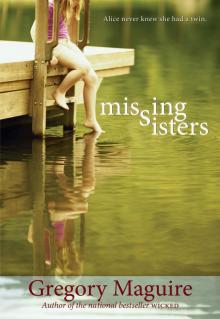 Missing Sisters
Missing Sisters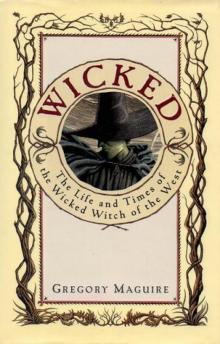 Wicked: The Life and Times of the Wicked Witch of the West
Wicked: The Life and Times of the Wicked Witch of the West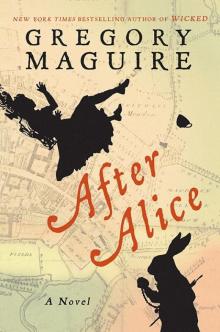 After Alice
After Alice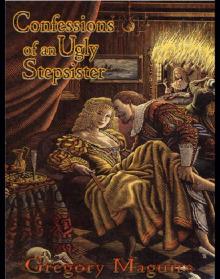 Confessions of an Ugly Stepsister
Confessions of an Ugly Stepsister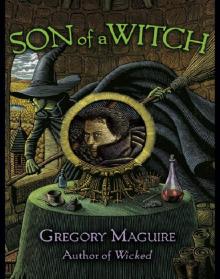 Son of a Witch
Son of a Witch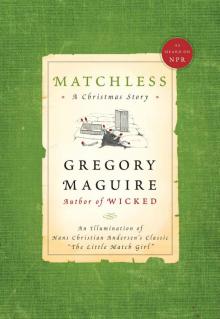 Matchless
Matchless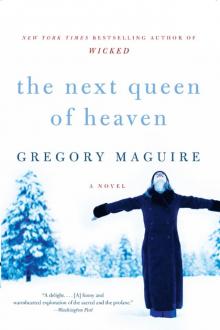 The Next Queen of Heaven
The Next Queen of Heaven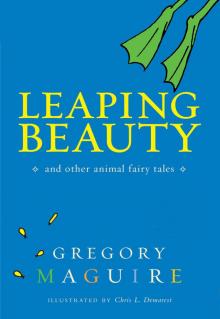 Leaping Beauty: And Other Animal Fairy Tales
Leaping Beauty: And Other Animal Fairy Tales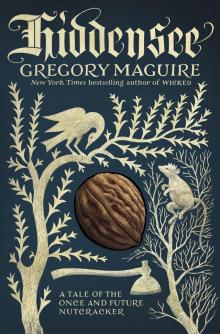 Hiddensee: A Tale of the Once and Future Nutcracker
Hiddensee: A Tale of the Once and Future Nutcracker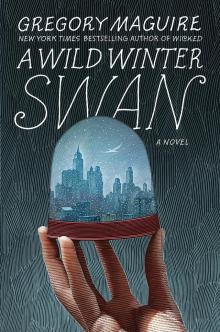 A Wild Winter Swan
A Wild Winter Swan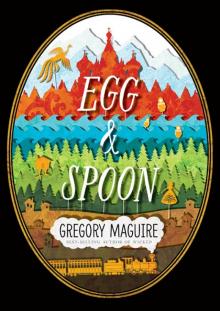 Egg & Spoon
Egg & Spoon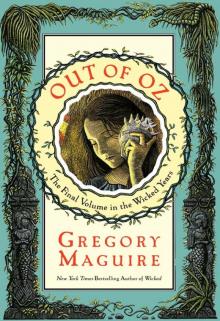 Out of Oz
Out of Oz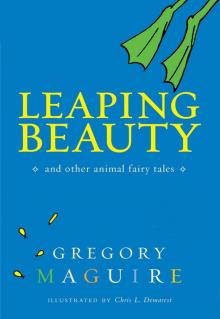 Leaping Beauty
Leaping Beauty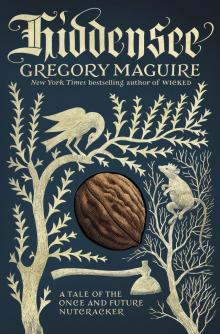 Hiddensee
Hiddensee The Wicked Years Complete Collection
The Wicked Years Complete Collection The Next Queen of Heaven: A Novel
The Next Queen of Heaven: A Novel